Author Spotlight: Emé Savage
On our author spotlight this week, we had a great talk with Emé Savage about her books.
Emé writes soulful fantasy with mysticism, magic and mayhem. She has published two books, with a third soon on the way. Emé is also working on a companion sci-fi series that will sit alongside her current fantasy series.
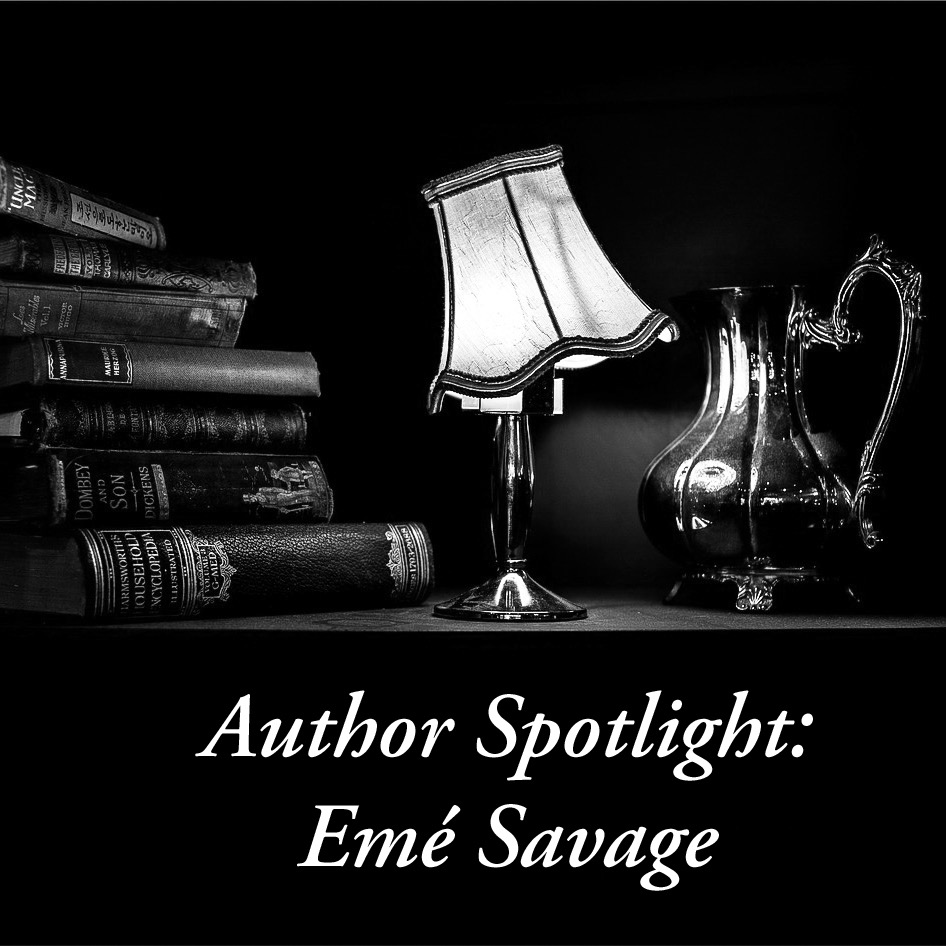
Transcript
Sarah: So welcome back everyone to Dear Writer, today we are on our 22nd episode and we have another author spotlight episode for you.
Ashley: Always exciting.
Sarah: Yeah. So we’re here with Emé Savage today. Hi Emé!
Emé: Hi.
Ashley: So Emé Savage is a fantasy writer based in Michigan, she writes soulful fantasy filled with mysticism, magic and mayhem. She has two publish novels, and two short stories, and I think she’s currently working on the next installment in her series. So welcome Emé. It’s nice to have you here.
Sarah: Yeah, welcome.
Emé: Thank you for having me.
Ashley: We love doing these interviews. It’s always so interesting having a chat with different authors about their writing styles and their writing journeys, we enjoy doing it a lot.
Sarah: Definitely. So, with that I think we’ll just dive right into our first question. Which is, how did you first get into writing? Was a passion that you had when you were quite young or did you sort of pick it up later on in life?
Emé: It’s something I’ve always done. Storytelling and creating that is, it was something that I did from a very early age, I wrote my first book, when I was seven.
Ashley: Oh, my goodness.
Emé: I did illustrations, there’s a notebook paper that I stapled together and—
Ashley: Cute!
Emé: —drew out the illustrations, and wrote the story and…
Sarah: That’s so awesome.
Emé: So yeah, it’s always busy that was an interest to me.
Ashley: How was your first novel as a seven year old, was it riveting? Have you read it since? Do still have it?
Emé: I don’t know what happened to it, I do remember that it was about a purple people eater.
Sarah: Oh amazing!
Ashley: Yes!
Emé: That’s what it was about. And how the purple people eaters are nice, and they’re not really bad like people always made them out to be and so I wrote a story about this.
Sarah: That’s so cute.
Ashley: So cute!
Sarah: The purple people eater!
Ashley: Did you say you had illustrated it as well?
Emé: I illustrated it so…
Ashley: That’s amazing.
Emé: Much better writer than I am an illustrator, I can say that for a fact, but yeah. So.
Ashley: I can’t so I get that.
Emé: Yeah I admire the skill, I don’t have it.
Sarah: I tried, but then later I look at them and I’m like mmm. Yeah, just stick to writing. Just stick to writing.
Emé: Exactly.
Ashley: So what, at what point did you realize that writing was something that you really wanted to pursue? Had you always taken it quite seriously, or was there a moment where you were like, actually no, this is something that I can do?
Emé: Well, I mean it took a long time to get to that point. Because you’re told at a young age, that that isn’t something… that’s just something frivolous to pursue, that you really can’t make a living doing that. And so you have these grown up adult things that you’re supposed to do in order to make a living, and to pay bills and so on and so forth. So it was, I started really thinking about it in 2005. So I would have been 30 at that point. And, I really started thinking about how I might be able to pursue it, but I had no idea where to start, none whatsoever. And social media back then was definitely not what it is today, and so like the IG community—the instagram community—now is so robust. There’s so much information out there, people are always so very helpful, but it just wasn’t there, you know, in 2005. So it started out kind of wanting just to see it in print. My father had just passed away and I thought, you know, what am I… you know pursuing things that I always wanted to pursue, and I’m like why don’t I just do it? So I didn’t have any illusions that I wanted anybody to actually read it, I just wanted to see it in print just for my own satisfaction. And then I started getting some feedback from people and they said, you know, this is actually a pretty good story. It still needs some work, but it’s actually a pretty good story. And I’m like, really? They’re like, yeah. I’m like okay well, maybe I could actually do something with this. And so I pursued finding a publisher to help me take this vision to another level. And I learned a lot through that process, I learned that maybe traditional publishing just isn’t for me, per se.
Ashley: Yeah, no that’s fair.
Emé: Yeah. It is fair, and it is good, some people… I mean that is a great fit for them, for me it wasn’t. Mostly because of the marketing piece. I didn’t know… I didn’t really fit into a specific box, as far as the genre that I write, it’s not like a pure epic fantasy. It’s not really like anything that I’ve really read, per se. So I didn’t really fit into this nice neat marketing box. And that was, that was a problem with the traditional publishing. And I didn’t really want to change my story so much that it lost the essence of what it actually is. So yeah. But I learned a lot from the traditional publishing, a tremendous amount of how to edit, what the process is like, you know, what an ISBN is. You know stuff like that, how to get something copy written and, you know, formatting and things of that nature. I learned a lot, but it just wasn’t the best fit for me, which is how I ended up doing self-publishing later on.
Ashley: Were you working, I guess, full time or wherever, at the time?
Emé: I was.
Ashley: When you decided to try and get…
Emé: Yeah, I was actually working as the executive director of a disability advocacy organization at the time.
Ashley: Oh wow.
Emé: Which I loved.
Ashley: I was gonna say, you would have been very busy.
Emé: Yes, I worked a lot, I was definitely a workaholic. So I worked 60 plus hours a week doing that, and I really didn’t have a social life, so I would just go home and I’d write. And that’s what I would do, and I was happy with that.
Sarah: So look what would your life look like now, like are you just writing? Or are you doing sort of part time work or…?
Emé: I am doing part time work, part of that is because of my diagnosis of lupus back in 2009. So I was not able to work full-time because of my illness. And I had to make a lot of adjustments, there was some medications I was taking that made it very difficult for me to get back into writing the way that I like to write. I was still able to edit but, you know, yeah making new material too, but I was having a hard time with that for a long time. And that was really, really a dark point.
Sarah: I imagine energy levels would be hard to sort of maintain and trying to create… you know, it takes so much out of you even just usually when you’re creating something, that I can imagine energy levels would be like a major factor.
Emé: Yeah. It took a long time, and then about 2018, you know, things started to calm down. My illness went into what’s called the acquiescent period, where it’s… I still have lupus, it’s just not active. And that’s when it really started, I’m like okay I’m getting back into this. I feel better, I feel like I can, you know, really put the energy into this, and I really got back into it. So, I do only work part time, I work part time at a fabric store.
Sarah: Oh that’s nice.
Emé: Which is my other passion, is working with fabric and creating things that way. I actually created a cosplay of one of my characters last Halloween, so.
Sarah: Oh, cool.
Emé: I do love doing costume design and costume design is an amazing way to really manifest the things that I’ve written into something that’s more of a physical aspect of that.
Sarah: Mmm. Do you find that your passion for, for fabric and creating these costumes and these works of art through fabric, does that give you inspiration for your books as well?
Emé: Definitely, I think, so too. I think so very much. One’s more of like an early medieval period, and then the other timeline in my novels are like Stone Age prehistoric type of ah, timeline. Kind of conceptualizing what that might look like has been really interesting.
Ashley: I was gonna say, that’s a very interesting time period to have a novel set in, which is really cool.
Emé: Well it’s a creation story, I wanted to start, you know, in a place where it’s fresh and new and not an established type of timeline like a like a lot of novels do, which is fine. But I just wanted to do something different.
Sarah: Yeah we definitely understand that, I mean we’re writing one that’s primarily set in 395 BC so it’s a little bit different.
Emé: That’s cool, I want to read that.
Sarah: Yeah. An ancient Greece novel is sort of what we’re doing. But out of the usual time period for them.
Emé: Yes, I love reading things that are outside of the normal traditional medieval time periods, so I think I find them so interesting and how people conceptualize it.
Sarah: I think there’s just so much to learn as well from different time periods, you know, and you’d think that oh we’re so far advanced now, but then you look back then, and actually they did have quite complex systems for things. Even like, way back when. And you’re like, wow. You know, we think we’ve come a long way, but maybe it’s not as far as what we thought.
Emé: Right, right.
Sarah: So that’s quite interesting.
Ashley: So I was going to ask you, what does a typical day look like, for you writing-wise? Do you try and devote a certain portion of your time every day to writing activities or you kind of go with the flow like when inspiration strikes, you just write?
Emé: Oh no, I’m a very disciplined person with writing. I am a night owl, so my husband is a morning person, so he gets up like super early like three-thirty.
Ashley: Oh my goodness.
Emé: That [indecipherable] godly hour.
Ashley: That is really early.
Emé: So that’s kind of when he does his thing, is early in the morning. And then I get up probably ideally would be about eight o’clock. But I stay up till midnight, one o’clock in the morning, so I’ll start probably 10 o’clock at night getting into my routine. Being at that point, like right now I’m going through preparation for camp Nano coming up in April. Reading through the material to get myself re-familiarized with it. So I’m going through doing some light revisions and things like that, making sure that the story is consistent and ready to go, so that I can start drafting, getting my drafting done. So for Nano, you need to do at least 1600 words every day. So I can either break that up into two sessions, where I’m doing at least eight hundred words each session, which takes about 30 minutes for me to write eight hundred words. Or I can do it all in an hour session and get my words in order to meet my goal.
Ashley: Oh my goodness.
Emé: It’s all on how fast I can type. That’s the main thing.
Ashley: How fast can you type?
Emé: And I just get into it, and I get in the flow and I know that I can get this many words done, down in this a period of time. And then the rest of time all throughout the entire day I’m just thinking about how I’m going to do, when I sit down at that time. So I’m just kind of percolating and marinating ideas in the back of my head all before I go sit down at night. And that’s how, that’s how I work.
Ashley: Oh my goodness. If only I could write that many words a day.
Emé: Yeah and there’s some people who do an insane amount, they’ll do like 7000 or 10,000 a day. I’m like how are you even doing that? I have no idea how they manage that.
Ashley: How do your fingers still work? It’s so much, so many words.
Sarah: I don’t know I could even type that fast.
Ashley: No, I’d be like, oh I need a rest.
Emé: I think because I took keyboard in class in high school, I am so grateful I took that my sophomore year in high school. And I am so grateful, I can type that fast because I don’t know what I would do if I had to hunt, you know my letters every time I’m trying to write. I just… my thoughts wouldn’t be able to, would be so much faster than what my fingers could do.
Sarah: I’m such a perfectionist that when, if I type something that’s wrong, rather than just dealing with it later, I have to like backspace and retype it, so that makes me quite a bit slower.
Emé: No I’m not quite there, no. Yeah, I’ll go along, I’ll just leave it and go back to it and get it later.
Ashley: I also cannot go, I just can’t leave things either, I really need to get better. Even just sentences I’m like oh, this sentence doesn’t sound perfect, let me spend ten minutes on it.
Emé: Yeah, you’re an internal editor. I learned that, because I… the first two novels took so long because I would do it that way, go back and edit as I was drafting. And nano just totally took that out of me. Because you can’t, if you’re going to meet your word count, you cannot be editing while you’re trying to draft. You’re not going to get the words that you need if you’re doing that constantly. And this third novel that I am—it’s in beta’s right now—but this third one, it only took me eight months to draft that entire novel, and that was over 100,000 words.
Ashley: That’s good, that’s quick.
Emé: I wrote more than that, but it took me eight months. And I was like amazed. I’m like, holy cow! I’m never doing this a different way ever again, this is the way I’m going to be doing it from now on.
Sarah: That’s awesome.
Ashley: Maybe we need to try that, Sarah.
Sarah: Yeah. I was just gonna say, um, speaking about your first few novels, do you want to give us a little bit of an idea about what your series is about?
Emé: It’s an epic novel that has your classic good versus evil kind of trope in there, but essentially what it is, it’s about these people, they have a direct line into the creator and the Gidat in this particular time, there are all but extinct due to a genocide executed by this king. And the king has acquired unnatural powers from Etevun, who’s known as the evil one. And so the Gidat, the lady, is sent by the Creator [to take T’Gan, a boy] out of the hands of the King, who wants him killed, and the reason why he wants him killed is that he will take down the King and his entire structure. And so he wants him dead. So the lady’s going to get him and deliver them out Sadat until he grows to an age where he can come back and fulfill the prophecy. So as she’s doing this, she’s telling the story about the very first Gidat, which is Minkos, all the way back to the very first day that humans have arrived on Georia. So it’s a creation story. And it talks about how Minkos deals with Etevun, because Etevun has been around a very long time, and so this boy learns who he is through the story of Minkos, and that’s essentially the first book.
Ashley: That sounds really cool. I really like the idea of having the creation story mixed in with it.
Emé: It started with the creation story, and then how this affects, you know, a later timeline that’s kind of what I was going for.
Ashley: I like that, that’s really cool. It’s quite different as well, like having something so far reaching to impact your story, it makes quite, be quite interesting.
Emé: I love having multiple layers to things, so I really gravitated toward that. And that’s why I was having such a hard time figuring out how to market this, so it’s a little bit different. So the second novel starts out with two different main characters that were introduced in the first novel. And so the main timeline takes place five years later, and it follows Kayfa, and Kayfa, we meet Kayfa at the end of book one. And I’m not going to say a whole lot about her, but she’s got a definite story.
Ashley: You’re like, she’s interesting.
Emé: Yes, She has a bit of a secret, and nobody knows the secret except the lady and so she… go back home someday to Sadat, and to deal with her father. So the lady gives her this magically enhanced book that tells the story of Felana, who’s from the creation period time period and it tells about Felana’s story and how she had become the leader of the people at the beginning. And so she’s reading through the story, and what her role is in the present timeline and her part in the prophecy, and so we go through Kayfa’s story and figure out what her part is in the whole thing, going to go back to Sadat and deal with her father. And that’s the second one.
Ashley: They sound so interesting. Are they kind of—sorry I’m just trying to think of the right words—um, are they sort of mirrored in the creation story, so you get this like foreboding sort of sense throughout the whole novel? That’s kind of what I, that sounds like which could be quite cool.
Emé: Repeat that one more time.
Ashley: Does, cause you said that they, they look back or have this like prophecy type thing that they’re reading, so is your story underpinned by like a sort of sense of foreboding about like what could happen to them, based on things from the past?
Emé: Yeah, definitely. Definitely.
Ashley: That’s cool I like books that have that kind of, you know, that feel through it where you’re like ooh!
Emé: This is coming, we’re building into something big. Yeah, definitely. Each timeline kind of has their own struggles and triumphs and, you know, you really get involved with the prehistoric timeline and kind of their struggle and how they’re dealing with Etevun, and then it’s also kind of informing this later timeline. That yeah, we’re building to something pretty big, and all of that we’ve learned from the past is going to be used in order for them to defeat Etevun in the future.
Sarah: I like the whole sort of multiple stories that you’ve got going on. Which sound like it could make it really three dimensional, and keep the readers really engaged throughout, rather than, you know, just following one storyline the whole way through. Like as you said, with the layers, I think it gives it more depth than what you could achieve with just like one storyline.
Emé: Yeah which the companion series that I’m working on, which is adding yet another layer to the entire universe, so.
Sarah: Yeah that’s really cool. We also quite enjoy multiple storylines going on in the one book. It makes it very fun to write.
Emé: The more complex it is, the more interested I am and the more I enjoy it. So I know there’s people out there like me who enjoy those kinds of stories.
Sarah: Yeah. Is there any particular authors that sort of inspire your writing?
Emé: And the main one is Madeleine L’Engle, and she’s the one that wrote A Wrinkle in Time, but Many Waters is the one that really drew me into how brilliant she actually is, and Many Waters is a Noah’s Ark retelling. Which is why I got interested in the whole creation story aspect of everything and engaging in a different timeline than the traditional timeline. She just, oh. I wish she was still alive, because I would love to sit down and pick her brain. Just so inspiring and she blended science fiction and fantasy together in such a beautifully artistic way. It’s just, I can’t say enough nice things about her, she’s just she’s my inspiration for how I tried to approach things, so.
Ashley: You’ve made a good case to read those two books I haven’t read A Wrinkle in Time or and hadn’t heard of… did you say Many Waters?
Emé: Well, she did, she wrote a Quintet and she’s written several books, but that one’s called The Time Quintet so it’s, you know, there’s a lot of time travel involved in going back and forth between early time [and the] modern time period, and you’re dealing with different science concepts, and mysticism, and philosophy, and it’s just… yeah. It’s really layered, it’s layered. It’s one of those complex layered pieces that every time you read it you find something new to gravitate to. You know, what I read as a kid and what I took from it as a kid is way different from what I take from it now, and yeah there’s a lot of really fantastic quotes that come out of that book. So, if you look up Madeline L’Engle quotes you’ll see a lot of them, and it’ll be like wow, okay.
Ashley: Like you wrote that, oh my gosh.
Emé: And she writes for children, so that’s the thing, but as an adult you get so much out of it, too, so.
Sarah: That makes me really want to head on to the down to the library and be like yes. Because I’ve heard, obviously, like most people have heard of A Wrinkle in Time especially, but I haven’t read it either so it’s definitely one to put on—more than one—to put her books onto a reading list I guess.
Emé: Yeah, yeah I definitely would.
Ashley: I’m wanting to like briefly bring it back to your books again, are they adult fiction?
Emé: They are, yeah. They’re not for kids.
Ashley: Yeah I was gonna say, they sound like weighty, they sound like very weighty topics, so I wasn’t entirely sure.
Emé: Yeah. The first one, you probably could get away with like high schoolers probably would be okay reading it, and there wouldn’t be anything really dark or disturbing in there that most kids probably haven’t seen already. But, like the second and the third, no. I would not let my kids… yeah. There’s some weighty topics in there as we get older, as the characters get older, so.
Sarah: Mm hmm.
Ashley: How many, how many words are these? Because you said the first two are published, right?
Emé: Yes, so the first one is about 100,000 words, give or take. And the other one’s probably closer to 95,000, so…
Ashley: Good lengths.
Emé: Yeah, not a super large fantasy novel, but it’s… yeah I think it’s a, it’s a sweet spot. I think 300 pages is a pretty good sweet spot.
Ashley: I think that’s a good spot for books to be, because when they get really long, sometimes it’s a bit intimidating, but I think the hundred thousand word mark-ish is a good length.
Emé: Well, and that’s from a marketing standpoint too. Like, when you actually… 300 pages is probably right about the right price point for people, otherwise you get too large, then your books are getting pretty pricey and is a new author people might not pick it up as quickly. Versus like 300 page book, you know is priced a little bit better.
Sarah: That’s a very good point to make, and I also feel that it might be… you know you might attract some new readers to the genre by having like a smaller book. Because I know fantasy is like usually massive, and I’ve read like some sci-fi/fantasy stuff, but yeah, it does make you think twice. Especially if you’re, I don’t know, in a bookstore in a library and you pick it off the shelf and you’re like, oh I don’t know whether I have time for that at the moment.
Emé: Yeah, yeah. Exactly. So that was, I mean, some people are like, yeah no problem I’ll pick up, you know, five hundred/six hundred page book and I’m not going to think twice about it. But some folks, yeah, if they’re not typical fantasy readers but they want to try it, you know, they you know, three hundred pages is probably going to be a little bit more, yeah I can try that out and see if I like it kind of thing. Versus, you know, having a… yeah six hundred pages is an investment.
Sarah: Yeah, yeah definitely.
Emé: A lot of them are very much worth the investment, though. I’ve read some really, you know, I read The Phoenix Host by C.K. Miller, and that was like six hundred pages, and it was a fantastic novel. Like, it didn’t feel like six hundred pages, it just read so well, so. They’re out there.
Sarah: Yes, yeah and I know that some people, you know, you get those whale readers who kind of prefer having really huge books, because they go through them so fast, but I would say, most people who have like a full time job and all the rest, would find it a little bit tricky to get through that amount, but you know each to their own.
Emé: Hey there’s an audience for everybody, so yeah you just got to know what your audience is like. And then find them.
Ashley: How did you find the whole self-publishing experience?
Emé: Like I said, I had, it’s a steep learning curve, but the way that the Instagram writing community is set up, the Facebook groups out there now, there’s so many more resources available for people who want to self-publish to be able to get access to different information and to try things out. I found that once I got back into this back in 2018 so much easier, because there’s just so much more available to look into, and so many more people to kind of use as a sounding board; Hey what did you do for this? How did you find your editor? How about designing your cover, how did you do that? How’d you find this or that? What worked what didn’t work? How do you price your books, how do you market your books? There’s just so much more out there to be able to help a person get to a point where they can have a nice polished work to present to the, to the world. So, yeah the social media has been instrumental, it really has been.
Sarah: Yeah I even remember back in, when we first started writing our books, we looked—we weren’t ready to be published by a long, long shot—but, you know, we started looking at it because obviously at the time we thought we were. And, things have changed so much since then, it’s amazing. You know, 2008 being like, what, twelve/thirteen years ago now? I’m really terrible at math. Excuse me if that’s wrong.
Emé: S’all right.
Ashley: I’m terrible maths as well.
Emé: I’ve gotten better. I wasn’t to start with, but I’ve gotten better.
Sarah: I just can’t do it in my head. So what’s, what’s next for you? So you working on your fourth one now, your fourth in your series, or…?
Emé: I have multiple things going at the same time. So like right now, my third novel in the series is with beta readers, so they’re going through it and giving me feedback right now. So while that’s happening, now I’m working on the science fiction companion series. So I’m starting with the first book of that, and getting that drafted. So I hope to have that completely drafted by July. So yeah, I’ll switch off, like I am a firm believer that you have to let your work rest from time to time. So at least a month or two. So switching between projects is a good way of doing that, and once they go through camp nano in April, I’ll let it rest for a couple months and then go back to working on the third book. So it’s kind of like this pipeline that you’re constantly filling, and they’re at different stages, and you just got to know when to let something rest. And then push that forward, and then go back to the other one push that forward to the next stage. So that you’re always constantly working on something and I think that helps prevent writer’s block and and burnout and things like that, when you’re switching between projects.
Sarah: Yeah helps keep your mind fresh.
Ashley: Definitely.
Emé: Mm hmm, exactly. And you know, being able to switch from a sci fi to a fantasy novel has actually been pretty good, I found. Because then you’re working on a completely different genre. It’s still within the same universe, you know, so everything’s kind of got touch points and I’m kind of linking things together and tying things together still. But it’s a different genre, it’s a different feel, different characters. So yes, it feels fresh.
Ashley: Do you have a potential… not release date, but time that you’re hoping for your third book to be ready to, ready to go?
Emé: Yes, so my goal is to have this third novel published by the end of the year, that’s my goal. So I’ve got people waiting to know what happens next, so I’ve got to deliver. And I really want to deliver.
Sarah: Yes.
Ashley: That’s a great place to be.
Emé: Yes. Yes, definitely. Success to me right now looks like a small group of devoted readers that really want to know what happens next, and so I feel like I’m succeeding there.
Ashley: I think that’s all you can ask for, really. It’s all you want, you want people to really like your story. And then just be like waiting to hear what happens next. So that sounds really great. How long do we have Sarah, I wasn’t timing.
Sarah: I think we’re probably just about ready to wrap this up, unless you had… is there anything else that you wanted to talk about Emé, or…?
Emé: Uh, no, I think I’ve covered at all. Other than my short story, I’m working on this short story that I drafted. I’m letting it rest right now, but I am going to have that one published in October.
Sarah: Oh, exciting.
Emé: So I usually do an anthology, participate in an anthology, and they do one every Halloween, so. So this one’s more of a… let’s call it grim/dark. Definitely dark.
Sarah: I love dark stuff.
Ashley: Grim/dark, I like it.
Emé: Yeah, so yeah, the novels aren’t quite that dark, but the short stories tend to go that way. I don’t know why, but they do.
Sarah: Dark is fine.
Emé: So, just gonna go with it and yeah so they end up in a Halloween anthology. So every October I plan on… and I have like, I don’t know, four more planned after that so we’ll see, and just put one out every year. Eventually I’ll just compile all those into my own anthology, and have that published on Amazon.
Sarah: That’s cool. I think short stories is something that I’d like to get into more, but I’m not very good at them, so.
Emé: I wasn’t either, I was not convinced. I prefer long form, but what I use the short stories for is to flesh out those little backstory things that I don’t have time for, or isn’t part of the core story of the novel.
Sarah: That’s a good idea.
Emé: And then I take them, and I flesh them out. So that has been working really well and that, that makes me happy because it’s still kind of connecting to the novels but it’s not, it’s like its own standalone story that I can just kind of hone in on a particular piece that I didn’t get to spend time on.
Ashley: How long are your short stories out of curiosity?
Emé: I usually try to keep them under 10,000 words.
Ashley: Okay, that’s all right.
Emé: So yeah. 5000 to 10,000.
Ashley: Yeah, okay. Yeah I don’t, I don’t write short stories.
Emé: I didn’t either, but now I do.
Ashley: Mine are too long-winded, way too long winded. I need to practice, maybe I should try again.
Emé: I didn’t either, and apparently I write them now.
Sarah: I tried writing one for a competition and they wanted like, 2500 words, I think it was. And I found that a struggle.
Emé: Oh god, I don’t think I could do with that. I don’t think I could do it that short.
Sarah: It’s like, oh.
Ashley: It’s like shorter than one of our chapters.
Sarah: I know!
Emé: Yeah exactly, my chapters are not that short.
Sarah: Yeah, our are, ours are usually around the three to four thousand mark.
Emé: See that’s not bad, so you just find a contest, that you know, fits your wordcount. Go with that.
Ashley: Find a longer one.
Emé: Yeah, find a longer one.
Sarah: To short. Move on.
Emé: Well that’s all I’ve got.
Ashley: Ah, okay. That’s all right. I was gonna say, how can people get ahold of you, if they want to find out more about you, or even find your books?
Emé: You can find my novels on amazon.com. So that’s where I primarily publish at this point. Looking to expand that, but for right now it’s amazon.com. You can also find me on Instagram at eme-savage, or on Twitter, same handle, or on Facebook, which is eme.savage. So either one of those. I love interacting with people, so please feel free to message me, comment on my posts, engage. I’m happy to do that, I love doing that so.
Sarah: It is very fun, I like networking with people and chatting to them.
Emé: Yeah, yeah. There’s one person that’s really into world building, so I’ll talk about world building all day long. It’s my favorite thing to do, so yeah.
Ashley: Well, thank you very, very much for coming on our show today, we’ve had such an interesting conversation with you, learning all about your sci-fi slash fantasy creation novels which sounds super interesting.
Emé: I like that, I like that designation, I might have to take steal that one. Sci-fi slash fantasy slash creation. Okay, yeah I like it. Thank you so much.
Sarah: You’re welcome. Yeah, so if anyone else wants to be on an author spotlight, like Emé has just done, feel free to contact us on lindersoncreations.com. Under the podcast tab you’ll find the ‘Be featured on Dear Writer’ and click on that, it’ll take you to a form to fill out just to help us know a little bit more about you. And yeah, what are we talking about next time, Ashley?
Ashley: So our next episode is one of our talking shop episodes where we chat about the books we’re currently reading, or podcasts that we’re listening to, to help us better are writing craft, but also a bit of a chat about what we’re reading just for fun.
Sarah: Yeah and so also if you wanted to get a hold of us again asides from the website, we also have lindersoncreations on Instagram and Facebook. And yeah if you liked this episode, then please rate and review us on apple podcasts, or subscribe on what if what if a podcatcher you use, happy writing everyone.









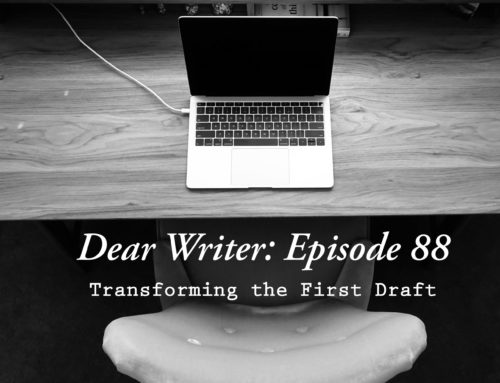
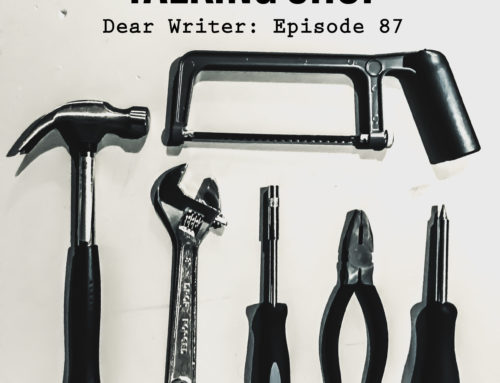

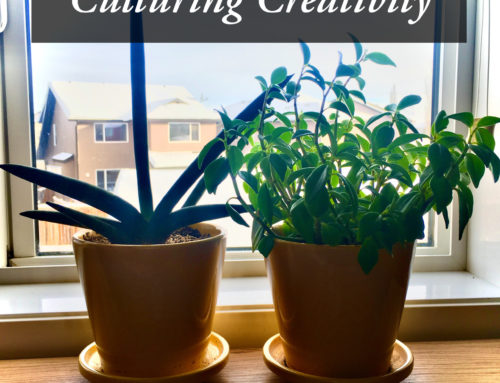

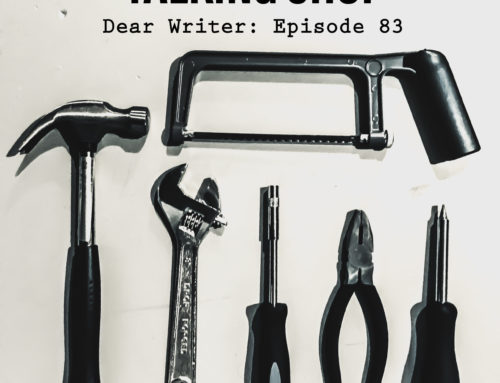


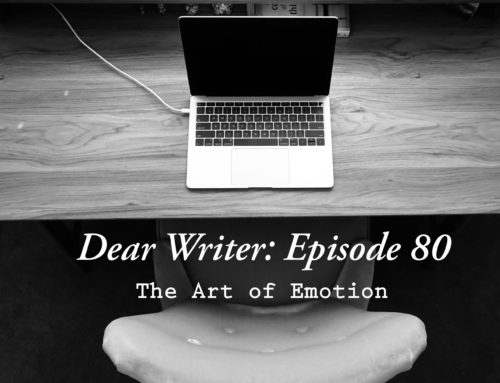
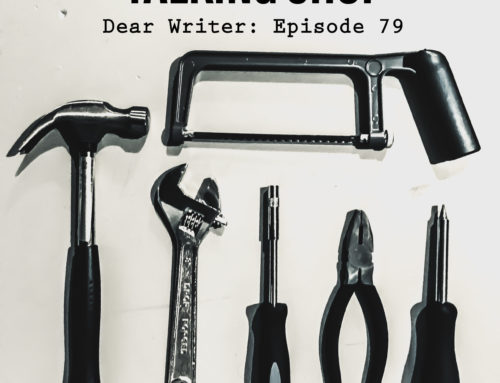
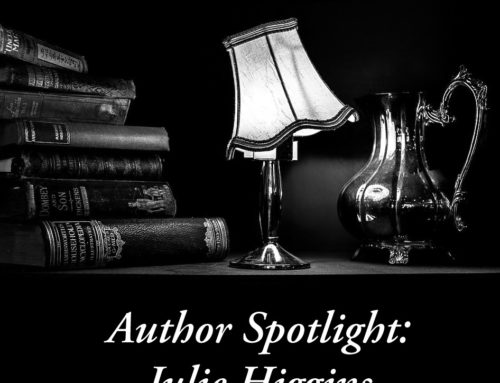
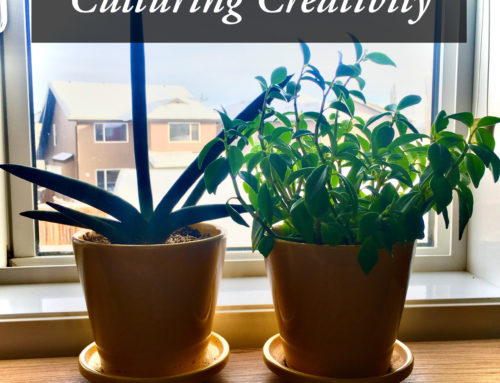
Leave A Comment